
Most patients have no way of assessing the mental state of their physician, but it could have a significant impact on safety. A systematic review published in JAMA Network Open (Nov. 27, 2019) analyzed data from 11 studies. Over 20,000 physicians were included in this meta-analysis. Depressed doctors pose a threat. The investigators found an association between physician depressive symptoms and medical errors.
Why You Should Care About Depressed Doctors:
The authors of this study point out that:
“Medical errors are a major source of patient harm. Studies estimate that, in the United States, as many as 98, 000 to 251, 000 hospitalized patients die each year as result of a preventable adverse event.”
That’s “just” in hospitals. How many errors occur in nursing homes, clinics and doctors’ offices?
The investigators go on to point out that:
“Depressive symptoms are highly prevalent among physicians, and several studies have investigated the associations between physician depressive symptoms and medical errors.”
When depressed doctors make diagnoses, prescribe drugs or initiate treatment, you may be at increased risk.
Doctor Burnout Is Dangerous to Your health!
Other research has revealed that when doctors are burned out and under emotional distress, patient care can be jeopardized. Depressed doctors don’t often seek treatment, and the organizations that employ them don’t provide much support for dealing with depression or burnout.
How common is physician burnout? Far more common than you might realize.
Here is a “systematic review” (Diseases of the Colon and Rectum, June, 2017):
“All US medical students, physicians in training, and practicing physicians are at significant risk of burnout. Its prevalence now exceeds 50%. Burnout is the unintended net result of multiple, highly disruptive changes in society at large, the medical profession, and the healthcare system. Both individual and organizational strategies have been only partially successful in mitigating burnout and in developing resiliency and well-being among physicians.”
An article in JAMA (Sept. 18, 2018) reviewed all the available research on physician burnout at that time.
The results are all over the map.
“This systematic review of 182 studies involving 109 628 physicians in 45 countries demonstrated remarkable variability in published prevalence estimates of burnout, with estimates of overall burnout ranging from 0% to 80.5%.”
In some studies “emotional exhaustion, depersonalization, and low personal accomplishment” prevalence ranged as high as 90%.
Depressed Doctors and Medical Errors:
When doctors are burned out and emotionally distressed, they are more likely to make mistakes (JAMA Internal Medicine, Oct. 1, 2018):
“This systematic review and meta-analysis provides robust quantitative evidence that physician burnout is associated with suboptimal patient care in the process of health care service delivery. We found that physicians with burnout are twice as likely to be involved in patient safety incidents, twice as likely to deliver suboptimal care to patients owing to low professionalism, and 3 times more likely to receive low satisfaction ratings from patients.
“We found that physician burnout is associated with a reduced efficiency of health care systems to deliver high-quality, safe care to patients. Preventable adverse events cost several billions of dollars to health care systems every year. Physician burnout therefore is costly for health care organizations and undermines a fundamental societal need for the receipt of safe care.”
What Can You Do About Depressed Doctors?
Patients should care about their doctors’ well-being. Not only is compassion for their physicians appropriate, it could have an impact on their own health. Perhaps it is time for patients to ask their doctors how they are feeling. Although many physicians are reluctant to talk about their own well being or seek help for depression, patients have every right to know if they are being treated by depressed doctors.
Here is a link to our book, Top Screwups. It provides crucial questions to ask health professionals so you can avoid medical mistakes.
Share your own thoughts about depressed doctors and medical errors in the comment section below.
Citations
- Pereira-Lima, K, et al, "Association Between Physician Depressive Symptoms and Medical Errors A Systematic Review and Meta-analysis." JAMA Network Open, Nov. 27, 2019. doi:10.1001/jamanetworkopen.2019.16097
- Rotenstein, L.S., et al, "Prevalence of Burnout Among Physicians A Systematic Review." JAMA, Sept. 18, 2018. doi: 10.1001/jama.2018.12777
- Panagioti, M., et al, "Association Between Physician Burnout and Patient Safety, Professionalism, and Patient Satisfaction A Systematic Review and Meta-analysis." JAMA Internal Medicine, Oct. 2018. doi: 10.1001/jamainternmed.2018.3713

